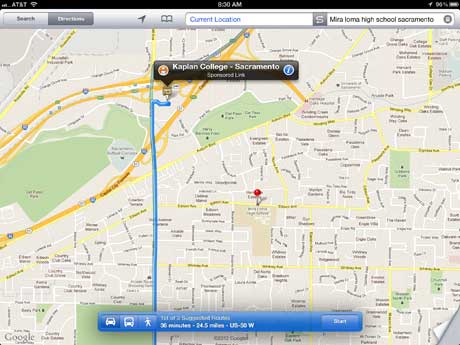Will GPS drown in commercialism?
There are few technologies that have changed our lives and work as fundamentally as GPS. Not so very long ago, if you needed to know where to go, you used a paper map. Today we simply punch in where we want to go, then listen to directions and monitor our position on the GPS display. And industry, of course, has taken wondrous advantage of GPS, using it to optimize and manage transportation and location-based services to a degree never thought possible. GPS, by any account, is totally crucial to our modern world and society.
That’s why a couple of recent observations worry me.
The first was when I left for San Francisco International Airport for a recent trip to Europe and my Garmin GPS did not find San Francisco Airport. Flat out did not find it. Not even in the transportation category. What it did find, though, was a hotel close to the airport. And so, since I was already underway and needed to concentrate on traffic, that’s what I had to choose as my destination. Which promptly meant that I missed an exit. I have to believe that a Garmin GPS ought to find San Francisco International Airport, but mine didn’t. All it coughed up was a hotel nearby.
After I returned from Europe, I needed to take my son to a local high school for a college orientation. I looked up the location of the college on Google Maps on my iMac and committed it to memory. In the car, I used the Maps app on my iPad, which is by Google, and the iPad drew the route from my home to the school. Except that it wasn’t to the school. It was to a “sponsored location” nearby. Yes, the official Maps app on the iPad guided me to a “sponsored location” and not to where I wanted to go. Without telling me. It did place a small pin where I actually wanted to go, but the route it drew was to the sponsor location.
That is a very dangerous trend. Project it into the future, and you might see a situation where GPS might be as utterly unreliable and frustrating as email is today. Just as we drown in commercial spam, what if GPS apps likewise will drown us in “sponsored locations,” making users sift through commercial GPS spam in order to find what we really need? That would make GPS not only useless, but potentially dangerous.
That, Google, would be evil indeed, and it’s already evil that I am guided to a “sponsored location” instead of the clearly defined location I wanted to go to.
How does that relate to rugged computing? It’s pretty obvious. What if commercial hooks begin hijacking routes? What if even official addresses are drowned in sponsored spam locations? Think about it.
And below you can see the routing to the sponsor location instead of the requested location marked by a pin (click on the image for a larger version).
